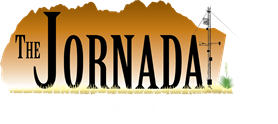Jornada Bibliography
.
2021. Long-term network research for the next agricultural revolution. Frontiers in Ecology and the Environment. 19(8):432-434.
.
2022. Measuring the social and ecological performance of agricultural innovations on rangelands: Progress and plans for an indicator framework in the LTAR network. Rangelands. :1-11.
.
2014. Modelling emergent patterns of dynamic desert ecosystems. Ecological Monographs. 84(3):373-410.
.
2021. Monitoring agroecosystem productivity and phenology at a national scale: A metric assessment framework. Ecological Indicators. 131
.
2000. Movements during colony founding by queens of the honeypot ant (Myrmecocystus mimicus Wheeler). American Midland Naturalist. 144:439-444.
.
2006. A multi-scale classification of vegetation dynamics in arid lands: What is the right scale for models, monitoring, and restoration? Journal of Arid Environments. 65:296-318.
.
2010. Practical guidance for developing state-and-transition models. Rangelands. 32(6):23-30.
.
2019. Prioritizing land for investments based on short- and long-term land potential and degradation risk: A strategic approach. Environmental Science and Policy. 96:52-58.
.
2017. Quantifying long-term trajectories of plant community change with movement models: implication for ecological resilience. Ecological Applications. 27:1514-1528.
.
2012. The 'range problem' after a century of rangeland science: New research themes for altered landscapes. Rangeland Ecology and Management. 65:545-552.
.
2022. Rangeland degradation in Mongolia: A systematic review of the evidence. Journal of Arid Environments. 196:104654.
.
2008. Is rangeland health relevant to Mongolia? Rangelands. 30:25-29.
.
2017. Rangelands: Where anthromes meet their limits. Land. 6(2)
.
2015. Rapid genetic restoration of a keystone species exhibiting delayed demographic response. Molecular Ecology. 24:6120-6133.
.
2008. Recommendations for development of resilience-based state-and-transition models. Rangeland Ecology and Management. 61:359-367.
.
2011. Reinterpreting historical data for evidence-based shrubland management. Natural Resources and Environmental Issues. 17(1):1-10.
.
2014. Resilience in ecology: abstraction, distraction, or where the action is? Biological Conservation. 177:43-51.
.
2008. Resolving critical issues for the development of ecological site descriptions: Summary of a symposium. Rangelands. 30(4):16-18.
.
2013. Response of lizard community structure to desert grassland restoration mediated by a keystone rodent. Biodiversity and Conservation Journal. 22:921-935.
.
2012. Revolutionary land use change in the 21st century: Is (rangeland) science relevant? Rangeland Ecology and Management. 65:590-598.
.
2013. The Savory Method can not green deserts or reverse climate change. Rangelands. 35(5):72-74.
.
2014. Savory’s unsubstantiated claims should not be confused with multipaddock grazing. Rangelands. 36(1):39-42.
.
2015. Scale-dependent feedbacks between patch size and plant reproduction in desert grassland. Ecosystems. 18(1):146-153.
.
2020. Scaling up agricultural research with artificial intelligence. IEEE IT Professional. 22:32-38.
.
2003. Scavenging ant foraging behavior and variation in the scale of nutrient redistribution in semiarid grasslands. Journal of Arid Environments. 53:373-386.
.
2019. Seasonal divergence of landscape use by heritage and conventional cattle on desert rangeland. Rangeland Ecology & Management. 72(4):590-601.
.
2021. Shrub encroachment, landscape restoration, and intraguild predation. Journal of Arid Environments . 193(3)
.
2018. Shrub encroachment, productivity pulses, and core-transient dynamics of Chihuahuan Desert rodents. Ecosphere. 9(7):Articlee02330.
.
2008. Simplifying ecological site verification, rangeland health assessments, and monitoring. Rangelands. 30:24-26.
.
2019. Small mammal herbivory and grassland recovery potential in the Chihuahuan Desert. Journal of Arid Environments. 166:11-16.
.
2010. Soil processes and properties that distinguish ecological sites and states. Rangelands. 32(6):9-15.
.
2006. Soil-Geomorphic Heterogeneity Governs Patchy Vegetation Dynamics at an Arid Ecotone. Ecology. 87:963-973.
.
2006. The Soil-geomorphic template and biotic change in arid and semi-arid ecosystems. Journal of Arid Environments. 65:207-218.
.
2011. Spatial perspectives in state-and-transition models: A missing link to land management? Journal of Applied Ecology. 48(3):746-757.
.
2012. Spatially explicit representation of state-and-transition models. Rangeland Ecology and Management. 65:213-222.
.
2012. Spatiotemporal patterns of production can be used to detect state change across an arid landscape. Ecosystems. 15:34-47.
.
2009. State-and-Transition models for heterogeneous landscapes: A strategy for development and application. Rangeland Ecology and Management. 62:1-15.
.
2008. State-and-transition models: recommendations for resilience-based application. Rangeland Ecology and Management. 61:359-367.
.
2012. A synthetic review of feedbacks and drivers of shrub encroachment in arid grasslands. Ecohydrology. 5:520-530.
.
2013. A test of critical thresholds and their indicators in a desertification-prone ecosystem: more resilience than we thought. Ecology Letters. 16:339-345.
.
2006. Threshold Concepts and Their use in Rangeland Management and Restoration: The Good, The Bad and the Insidious. Restoration Ecology. 14(3):325-329.
.
2020. Traversing the Wasteland: A Framework for Assessing Ecological Threats to Drylands. BioScience. 70(1):35–47.
.
2017. Two New Mobile Apps for Rangeland Inventory and Monitoring by Landowners and Land Managers. Rangelands . 32(2):46-55.
.
2017. Two new mobile apps for rangeland inventory and monitoring by landowners and land managers. Rangelands. 39:46-55.
.
2006. Using unmanned aerial vehicles for rangelands: Current applications and future potentials. Environmental Practice. 8:159-168.
.
2011. Vegetation maps at the passage of the Taylor Grazing Act (1934): A baseline to evaluate rangeland change after a regime shift. Rangelands. 33(1):13-19.
.
2008. What can ant diversity-energy relationships tell us about land use and land change (Hymenoptera: Formicidae)? Myremecological News. 11:183-190.
.
2017. What the novel ecosystem concept provides: A reply to Kattan et al.. Restoration Ecology. 25:488-490.
.
2001. Buffelgrass invasion: What is the value of a desert? Chihuahuan Desert Nature Park Newsletter. :1.
.
2005. State and Transition Models 101: A Fresh Look at Vegetation Change. Quivira Coalition Newsletter. 7:6-11.



